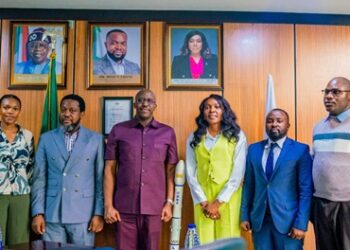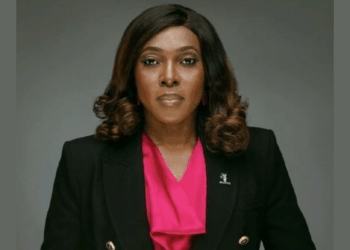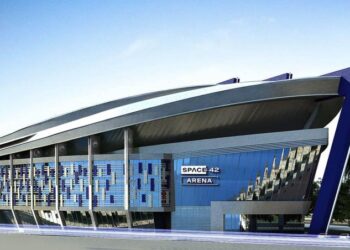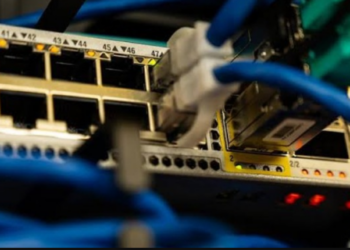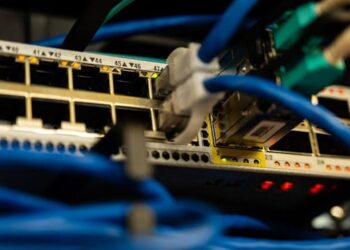The Nigeria Communications Satellite (NIGCOMSAT) Limited recently kicked off plans to acquire two new satellites with the support of global investors.
The satellites are to replace the current NIGCOMSAT-1R, which is nearing its 15-year lifespan.
Against this backdrop, Mr. Diseye Isoun, who is the Chief Executive Officer of Content Oasis, an integrated network services provider and ISP headquartered in Abuja, spoke with Nairametrics on how Nigeria can fully utilise its satellite to achieve improved connectivity and bring down the cost of internet access.
Isoun believes that the recently launched 90,000-kilometer fibre project in which the government seeks to invest $2 billion may not achieve its aims of lowering internet costs and improving connectivity if satellite connectivity is not integrated. He also spoke on the impact of Elon Musk’s Starlink on smaller ISPs in Nigeria, among others. Excerpts:
Nairametrics: What can you say about the plans to acquire two new satellites, the cost, and how will this benefit the digital landscape in Nigeria?
Diseye Isoun: The original satellite, I think was purchased for around $250 million through a Chinese loan facility. With the efficiencies and positive technology disruptions in the satellite industry, purchasing new satellites right now should cost much less.
But again, I think two new satellites should help with the concept of redundancy, which is one thing being used against NIGCOMSAT. If they have one old satellite and two new, they have a story to tell about being able to provide a backup if one satellite has an issue.
In terms of digital connectivity, there are many alternatives these days also in the satellite space. But you know, no foreign company will prioritize your country as much as you would. So, all these companies still have to make decisions on where they provide service how good that service is, and how much capacity they provide to a given country.
We don’t have any of that. So, if it’s done right, NIGCOMSAT capacity can ensure that there is connectivity in hard-to-reach places in Nigeria, and they will also be able to provide services to internet service providers.
So, my personal opinion is that if they are able to collaborate with internet service providers, not telcos, I’m not talking about MTN and other MNOs, I’m talking about the small ISPs around the country. Now that could be a catalyst for growth but again, that’s not going to happen automatically. It’s going to need policy, it’s going to need support from the Ministry and the NCC to make that work and improve our connectivity.
Nairametrics: Do you see this impacting the cost of internet in Nigeria?
Diseye Isoun: That is a very good question. I think two things should not be mixed. One is reliable access, and the other is cost. I honestly believe that the issue of reliable access is just as important as the issue of cost.
If you sit in a second-tier capital, like Uyo, or Yenagoa, you will definitely have issues with connectivity. So, you will have to deploy solutions that allow people in those areas to have a good service. And then in many cases, they will have little ability to pay.
The truth is that with the devaluation of the Naira, the current costs of service in Nigeria might not necessarily be so exorbitant compared to the rest of the world. So, what I believe is an issue is accessibility and the quality of service especially outside of the Lagos, Abuja, and Port-Harcourt axis, which are the places the traditional telcos are focusing on.
Nairametrics: For many Nigerians, NIGCOMSAT buying new satellites would sound like an attempt to squander money given that many did not feel the impact of the existing satellite. What do you think should be yardsticks or parameters to measure the impacts of the new satellites when eventually acquired?
Diseye Isoun: I think there are two things again, one is kind of hard-to-measure issues around the security requirements of Nigeria. If the satellite is used properly, it can be very helpful with things like border security, communications in hard-to-reach places for those that are supposed to secure restive areas of the country etc. So, there is that aspect, which is in a macro sense, with a lot of other variables we should see improvement in security and NIGCOMSAT should be able to be part of that.
But on the commercial side, I do believe that the NCC should be able to show coverage. Let’s say the 4G coverage in Nigeria right now is about 33%, there is no reason why NIGCOMSAT should not be part of bringing the coverage to 70-80% with the right policy and the right partnership.
But again, one thing has to be very clear, NIGCOMSAT will always be part of the solution. By itself, NIGCOMSAT does not have the value, its value comes from the ability to collaborate and to be part of connectivity solutions. And a brain box does not make a car, you still need all the other aspects so we always have to keep that in mind.
In the US, for example, small and medium-sized businesses are actually driving a lot of the economy even though what you hear about is the big names like Microsoft. I believe the Internet will grow the way it needs to when the small ISPs have a much bigger market share and satellites is a critical component of that.
Nairametrics: How about the 90,000-kilometre fibre project of the federal government, which is also aimed at improving connectivity across the country?
Diseye Isoun: Crafting a project like the 90,000 kilometres of fibre and having it in a different silo from the satellite initiatives or satellite connectivity is not ideal, because the two have to work hand in hand.
If you have satellite, the benefit of satellite is that you can just put your satellite equipment somewhere and begin to backhaul it. Now, people will argue that it may be a bit more expensive than fiber.
Still, you have to combine the power of satellites to provide service in very hard-to-reach places with the short timeframe to connect and the longer-term benefits of having improved fiber infrastructure, which ultimately should drive prices down and ultimately should improve service. This shouldn’t be two separate conversations in my opinion.
What we’re seeing is this $2 billion fibre investment. A solid high throughput satellite today, which will have up to 50 gigabits per second will run you may be conservatively 100 million dollars, which is 5% of the $2 billion.
Now, that satellite today will have enough capacity to connect a lot of places I mean, thousands of base stations can be connected on that and have an immediate impact. So, we are not saying one is better than the other, what we are saying is both need to work together.
Nairametrics: Can you tell us a bit about your relationship with NIGCOMSAT?
Diseye Isoun: NIGCOMSAT first launched its communication satellite in 2004, which is distinct from an observation satellite. At that time, we were one of the first resellers of NIGCOMSAT services and capacity back in that day. So that’s how our relationship began. We were resellers of their services and worked with them through the challenges of a new satellite operator and we have kept some level of relationship with them until today.
Nairametrics: As someone who has been with NIGCOMSAT for a very long time, the feeling in the ICT industry is that the satellite has not been impactful in terms of connectivity. What can you say about that?
Diseye Isoun: First and foremost, I would say that part of having a satellite is an opportunity to have a seat on the table in the space industry. Any country that is trying to be a leader in their region just like Nigeria Nigeria has positioned itself in Africa, has to be part of the Satellite Operator Agents Association.
Through that, you also learn a bit about the industry and there was a lot of training that occurred, especially in the early days. A lot of NIGCOMSAT engineers who were part of the design, the launch, and the operation of the satellite were trained. So, I just want to say to you that some soft national benefits are not just about the commercial aspects or the end user business aspect. So, in that sense, Nigeria has benefited.
In terms of the inability to step up to opportunities, I think, you know, one of the major issues is that they have a dependency on government business. In any country, government business is always challenging because their cash flows are not very reliable and they’re not consistent. And they have to depend on budgets and all that but at the end of the day, I would say in general, they were unable to get user commitments or contracts, that could tie one agency or government projects for up to three years.
If you sign a two to three-year contract and you are paid on time, then you can invest, you can raise money, you can take loans, and you can service your business on those expectations of future cash flows.
They were not able to have much opportunity, in that sense. So, the lack of collaboration certainly did not help.
Nairametrics: Talking about NIGCOMSAT’s inability to get customer commitment either from government agencies or the private sector, why are they not getting customers?
Diseye Isoun: I think it boils down to political will in many ways to say look, we are willing to stand behind NIGCOMSAT and we are willing to set up a policy or rules of engagement that will encourage the use of NIGCOMSAT. If for example, you are enforcing existing local content law, already, NIGCOMSAT would have an edge in the sense that there is no other satellite company in Nigeria, per se.
So, for a few reasons, they should have an automatic benefit. If another person wants to launch a satellite in Nigeria, they can also argue for local content. This will go a long way in assisting NIGCOMSAT.
Nairametrics: You mentioned earlier that you started off as one of the first set of resellers to NIGCOMSAT. You must have been approaching certain companies to come and buy the service. What was the experience like?
Diseye Isoun: There was definitely apprehension, something new or unknown, some of our own prejudices. But at the end of the day, some of the successes came from either government-funded projects or government initiatives. Galaxy backbone, to be specific is a good example.
There was a time when Galaxy Backbone was a good customer of NIGCOMSAT. We had a role to play, in ensuring and supporting the VSAT customer premises equipment for Galaxy.
So that was a good tripartite arrangement, where a private company was providing support and NIGCOMSAT was benefitting from the utilization of their capacity, and between the two of us we were providing a service to the Galaxy Backbone which effectively is the IT department of the government and they were was servicing their clients, the government, using NIGCOMSAT. This was a success story.
Once again, sustaining this kind of business with the sometimes erratic cash flow of government is not ideal.
Nairametrics: There have been some concerns among ISPs that the entry of Starlink, a satellite internet provider, is going to lead to the death of many small ISPs in Nigeria. We have already seen Starlink climbed to to the third position in terms of customer numbers in just one year of its operation. Do you share this sentiment that Starlink is a threat to ISPs in Nigeria?
Diseye Isoun: No, I don’t think so. I think Starlink, currently and even in the future, will be able to benefit only the rich. The problem is not that Starlink is going to take somebody’s business, the problem is that ISPs effectively don’t exist. Sorry, that’s the bottom line.
They don’t exist in an order of magnitude sense. So, they’re not taking from anybody they are simply filling a current need.
They may take a little bit from the telcos. But they are doing a model where they are doing fine with providing service to just a subset of Nigerians.
And again what is wrong with an ISP partnering with Starlink and using Starlink for the backhaul and redistributing with some kind of last-mile solution? This is the model that ultimately should work; they should complement each other.








